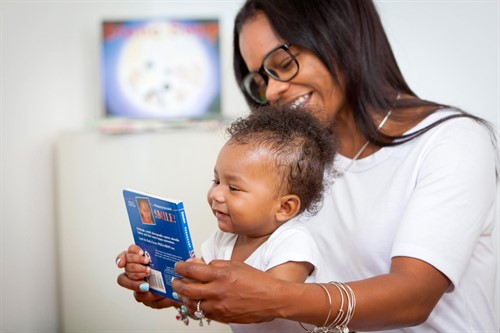“Significant or experiential learning has a quality of personal involvement: it is self-initiated, it is pervasive, it is evaluated by the learner, its essence is meaning.”- Freedom to Learn by Carl Rogers
Language development is emphasized in the process of developing reading and literacy skills. Why is language important?
The learning process goes on naturally during all of children’s waking hours. Children are constantly learning from their environment, their family members, their peers, etc. Children assimilate information gained through play and interaction into an understanding of the world and its functions. This type of learning is non-compartmentalized. Children do not say to themselves, “I’m learning about reading how” when they read the cereal box or a road sign. Instead they see all the experiences of life as a whole and they see the interconnectedness of these experiences. That why for some children their first experiences at school can be difficult. Suddenly something that they might have called “play” before has shifted to “work” and is placed into a new and separate category. Reading and writing are no longer fun things to play with – they are something to “work” on.
Children learn through play. It is the ultimate thinking and problem-solving activity. In play, children combine vast amounts of stimuli and information and then assess, evaluate and assimilate that information into their current thinking. Think about it, isn’t that some very high level thinking! It has been found that children develop literacy skills when they “play” with langue, reading and writing from an early age. In play children reconstruct what they have observed literate people do. As they reconstruct, they make this “literate” behavior their own.
Children pick up some important messages about the symbolic function of print along the way. It is because children are naturally curious and industrious that they learn so fast. Numerous research studies into the behavior of babies and infants give evidence of an internal need to interrelate wit the environment around them. Jean Piaget and other experts described this as an inner mechanism of biological adaption. The immediate physical environment is always inevitably challenging for young children. But however successfully they adapt mentally and physically to the challenges they meet, children requite the early stimulus of language for optimal development.
Children develop dispositions toward language and literacy. The interrelationship of everyday life experience and all aspects of a child’s language development – talking listening, writing and reading – are well recognized by teachers of young children as forming the basis of successful learning. Literacy learning takes place best when individuals are happy and confident. In a home environment where life’s day-to-day experiences are discussed, anticipated, and reflected on in talk and where people read and write for a wide variety of purposes, young children adoptsuch behaviors themselves. In a sense, they become “apprentices” playing out the behavioral models around them. What may look like just imitative play is really the beginning of essential language and literacy skills. In such play, children develop a positive disposition towards learning, language and literacy. These skills are not seen as something separate that has to be “worked” on, instead they are seen as a part of life. Children want to talk, want to read, and want to write. These dispositions, if supported and modeled at home and school, will stay with children throughout their lives and children will approach ALL learning from a literate point of view.

